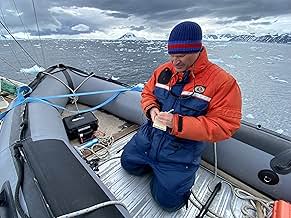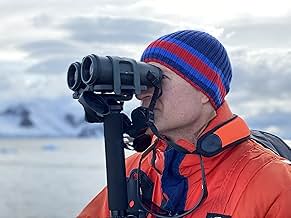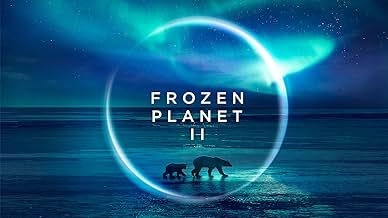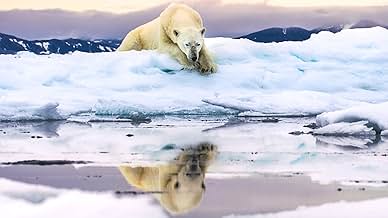CALIFICACIÓN DE IMDb
9.0/10
2.5 k
TU CALIFICACIÓN
Sigue la vida en todo el cuarto helado del planeta, incluidos los osos polares, los tigres siberianos, los monos de las nieves y los pingüinos.Sigue la vida en todo el cuarto helado del planeta, incluidos los osos polares, los tigres siberianos, los monos de las nieves y los pingüinos.Sigue la vida en todo el cuarto helado del planeta, incluidos los osos polares, los tigres siberianos, los monos de las nieves y los pingüinos.
- Nominada a2premios BAFTA
- 2 premios ganados y 6 nominaciones en total
Explorar episodios
Opiniones destacadas
I have been watching the episode of the penguins
in St Georgia..it could be a scene from 'Happy Feet' not sure wether it's real or not.
How do they get the crew to such a remote part of our planet and get amongst the thousands of penguins without disturbing them.
I would like a follow up program of how this is achieved behind the camera..I am a doubting Thomas and feel it's all done digitally.
The close ups showing such colour and detail of different species of birds and animals the wild seas and harsh land.
It is still a fantastic achievement and makes you realise how wonderful our planet is showing nature at its most beautiful and often dangerous.
How do they get the crew to such a remote part of our planet and get amongst the thousands of penguins without disturbing them.
I would like a follow up program of how this is achieved behind the camera..I am a doubting Thomas and feel it's all done digitally.
The close ups showing such colour and detail of different species of birds and animals the wild seas and harsh land.
It is still a fantastic achievement and makes you realise how wonderful our planet is showing nature at its most beautiful and often dangerous.
There is no question the photography here is excellent and the dedication to the making of this documentary to be admired but for my wife and myself there were two aspects of this that just grated and really spoiled it.
Firstly, in the 1st and 4th episodes filmed in the Antarctic and showing the teamwork involved in "wave washing" penguins and seals that were seeking refuge on iceflows, Sir David repeatedly and consistently referred to the animals as "killer whales".
They are NOT killer whales. That is an unfortunate nickname that went out of use so many years ago that this is the first time I've heard anybody refer to them as such in at least a decade if not longer. They are Orca.
Killer whales would be fine as an alternative if for one fact: they are NOT members of the whale family fore crying out loud and it is just wrong to refer to them that way.
Orcas are members of the oceanic dolphin family. Yes, the name is arrived from the latin for "whale" but that was an error in naming them dating back to the 19th century. It's unfortunate, but it was forgivable back then for thinking they are whales. We know better now and should correct the mistake by not referring to them as whales as an English name for them.
I read recently that the nickname originally given to them was not even "killer whales"; it was "whale killers" because Orca has been observed to kill whales. Somehow the name got reversed and it stuck.
"Orca" is the correct and widely accepted name so use it.
Unfathomable that Sir David has agreed to use the term "killer whale" in his narration because he was must surely know it is wrong. In fact, by coincidence I happened to see another Attenborough documentary this week in which he actually did refer to them several times as "Orca". So why "killer whale" here which only serves to perpetuate the error that these are whales?
Second mistake came in the fourth episode and was more of a misleading statement. In the section on the Antarctic interior he was talking about the active volcanos in the interior mountain ranges. He then showed video of Mt. Erebus and the Erebus lava lake in the crater and used it as an example. Erebus is NOT on the mainland of Antarctica but on an offshore Island near the mainland but in the Ross Sea. Again, the information was just wrong. Why suggest that Erebus is an interior volcano when it isn't?
Problem is that when one catches out narration having two errors like the above, you start to wonder what else they have got wrong. What other factual errors were there that we didn't catch?
I'd love to have given this series a 10 for the visuals alone but two points docked for the two script errors that I caught.
Firstly, in the 1st and 4th episodes filmed in the Antarctic and showing the teamwork involved in "wave washing" penguins and seals that were seeking refuge on iceflows, Sir David repeatedly and consistently referred to the animals as "killer whales".
They are NOT killer whales. That is an unfortunate nickname that went out of use so many years ago that this is the first time I've heard anybody refer to them as such in at least a decade if not longer. They are Orca.
Killer whales would be fine as an alternative if for one fact: they are NOT members of the whale family fore crying out loud and it is just wrong to refer to them that way.
Orcas are members of the oceanic dolphin family. Yes, the name is arrived from the latin for "whale" but that was an error in naming them dating back to the 19th century. It's unfortunate, but it was forgivable back then for thinking they are whales. We know better now and should correct the mistake by not referring to them as whales as an English name for them.
I read recently that the nickname originally given to them was not even "killer whales"; it was "whale killers" because Orca has been observed to kill whales. Somehow the name got reversed and it stuck.
"Orca" is the correct and widely accepted name so use it.
Unfathomable that Sir David has agreed to use the term "killer whale" in his narration because he was must surely know it is wrong. In fact, by coincidence I happened to see another Attenborough documentary this week in which he actually did refer to them several times as "Orca". So why "killer whale" here which only serves to perpetuate the error that these are whales?
Second mistake came in the fourth episode and was more of a misleading statement. In the section on the Antarctic interior he was talking about the active volcanos in the interior mountain ranges. He then showed video of Mt. Erebus and the Erebus lava lake in the crater and used it as an example. Erebus is NOT on the mainland of Antarctica but on an offshore Island near the mainland but in the Ross Sea. Again, the information was just wrong. Why suggest that Erebus is an interior volcano when it isn't?
Problem is that when one catches out narration having two errors like the above, you start to wonder what else they have got wrong. What other factual errors were there that we didn't catch?
I'd love to have given this series a 10 for the visuals alone but two points docked for the two script errors that I caught.
Documentary showing difficult conditions animal and plant world deals with in still frozen parts of planet. Their adaptations to this places in order to survive, beat the competition of other species who did not ventured that far. It is gruesome as all predatory food chain is. But not for indulgence, but basic survival. Completely different story from that humans developed. They are pointing at the root cause of the melting icebergs and acceleration of the changes, what they mean for these specialised animals. Even we humans can not adapt as quickly to the surges in heat and consequences of it. Technology is our tool of adaptation, but is also a cause of the emissions causing the warming up. We need to change the energy sources and our level of population growth and material demands. It is not a favour we do to those animals, it will become a necessity in less time we want to admit to self and others. COVID came rapidly, warnings were there for years to invest in better research and prevention. Climate change is happening for some time and accelerates every year with more devastating consequences. Yet, people who are relatively comfortable, watching their TV programmes, either feel helpless or became ignorant. It is not happening to them. No flood water destroying the house irreversibly, no land slides, no hunger, no waterborne diseases, loss of relatives in many milder parts of the world. The shocks are sadly in the most extreme environments, be it polar regions, or tropics, where isolated animals and human population struggles every day. I do not think the filmmakers are extreme or selling the soap opera of animal world. The storyline is made in the way people can connect and see themselves in lives of other species. Most people project their emotions. And it helps them to realise animals feel I is mostly hunger, pain, fear, but also some joy. They are fighting for their lives every day and it is getting harder, and more fatal, shortening lives for the individuals and whole populations due to rapid disappearance and alternations to the environment they were adapting for very long time.
Should we intervene? Yes, we need to reverse the first intervention and stop heating up the planet. Otherwise these series maybe one of the last documentaries showing these animals still in their natural environments.
Should we intervene? Yes, we need to reverse the first intervention and stop heating up the planet. Otherwise these series maybe one of the last documentaries showing these animals still in their natural environments.
This series is not only the frozen but It's still have a great meaning of the life and death. Even a how she should survive and how she could find another life it's difficult to let any other subject but PTC natural history is another level so wonderful life wonderful life so she should watch is legendary people who are great effort for camera for another level of enough quotes the high mountain.
Everybody say documentary film is very important for a human for for an artificial in the world lived but this could be real things we are find out and that's this she is so wonderful that so this is wonderful.
Everybody say documentary film is very important for a human for for an artificial in the world lived but this could be real things we are find out and that's this she is so wonderful that so this is wonderful.
Each time I watch one of the BBC wildlife series, especially those narrated by Sir David Attenborough, I'm always blown away by the level of detail and camera angles the production of team achieve.
The latest series have just upped the game, an early sequence with Killer Whales is simply outstanding. Later footage of a bear attack and calves trying to survive, creates more tension and emotion than most Hollywood movies.
Its so important that various at risk species are documented and the general public are educated and informed about the world's wildlife. The BBC seem to have some of the best wildlife photography I've ever seen. Outstanding...!
The latest series have just upped the game, an early sequence with Killer Whales is simply outstanding. Later footage of a bear attack and calves trying to survive, creates more tension and emotion than most Hollywood movies.
Its so important that various at risk species are documented and the general public are educated and informed about the world's wildlife. The BBC seem to have some of the best wildlife photography I've ever seen. Outstanding...!
¿Sabías que…?
- ConexionesFeatured in Points of View: Episode #79.2 (2022)
Selecciones populares
Inicia sesión para calificar y agrega a la lista de videos para obtener recomendaciones personalizadas
- How many seasons does Frozen Planet II have?Con tecnología de Alexa
Detalles
- Fecha de lanzamiento
- País de origen
- Sitio oficial
- Idioma
- También se conoce como
- Frozen Planet II
- Productoras
- Ver más créditos de la compañía en IMDbPro
Contribuir a esta página
Sugiere una edición o agrega el contenido que falta



























